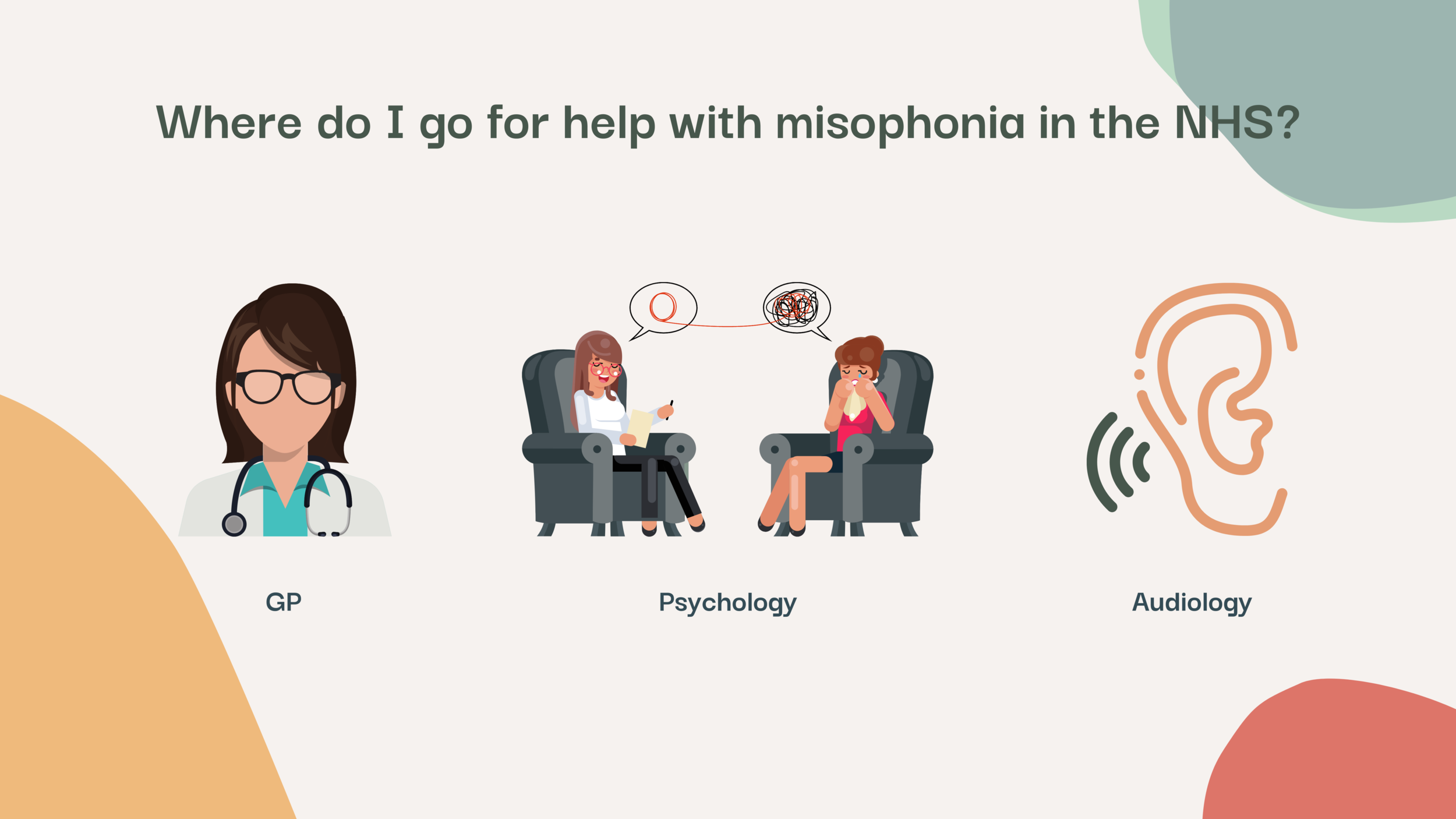How to get help for misophonia on the NHS
If your misophonia is at the point where it is impacting your mental health or interfering with your work, studies or relationships, you may be able to receive help from the NHS. It may take a while, and may feel like an uphill battle at time, but help is available.
If you are looking for mental health support for misophonia, you could try local psychology services or national psychology services specialising in misophonia (see below). Audiologists may also be able to diagnose misophonia and provide you with some strategies for managing it. Keep in mind that many health professionals are not familiar with misophonia, and you may need to provide them with some information to help with your referral. Misophonia is mentioned as a type of noise sensitivity at the bottom of a page about hyperacusis on this NHS website and there is a detailed description of misophonia on this Oxford Health NHS website. These could be a starting place to let your GP know that this is a condition recognised within the NHS. We will add more information to this website to help you in this journey.
Local psychology services
Your local psychology services are there to provide therapy for common mental health problems, including the mental health impact of long term conditions. Look up IAPT (Improving Access to Psychological Therapies) in your area. Most services accept self-referral, which means you do not need to see your GP first. They will, however, notify your GP that you have self-referred, and will advise your GP if you are offered treatment.
It is probably best to focus on the mental health impact of misophonia in your referral form, rather than asking for help with misophonia specifically. Bear in mind that they may not have heard of misophonia. It is okay to ask if they have any therapists who are familiar with misophonia and the impact it can have on mental health.
You will likely be offered an assessment first. This will involve talking about the problem and how it impacts you. It’s good to focus on the impact it has on your mood, work, study and relationship. If you are offered treatment then it will most likely be either guided self-help or “high intensity” cognitive behavioural therapy (CBT). Guided self-help is typically working through self-help materials with support from a psychological wellbeing practitioner, who is trained to deliver this kind of support. High intensity CBT is usually done by a clinical or counselling psychologist, or a cognitive behavioural therapist.
If your local services are not able to help, then you may want to consider asking for a referral to a specialist psychology service that has therapists trained specifically to work with individuals with misophonia.
NHS Psychology Service Specialising in Misophonia
The Oxford Health Specialist Psychological Interventions Centre (OHSPIC) is a national service and they accept referrals from any NHS professional. They will then ask the person who referred you to apply for funding from your local area to pay for your specialist treatment. Researchers at this clinic are conducting research into CBT for misophonia in conjunction with the University of Oxford. You may be invited to take part in evaluations of misophonia treatment, but you will not be denied treatment if you do not want to participate. Your treatment will be carefully monitored to make sure that the therapy is helpful for you and is making a difference to your misophonia. They offer treatment for adults, children and young people.
Audiology and ENT services for misophonia
If you are not looking for mental health support, then you might ask your GP to refer you to audiology for a diagnosis and further information. This document from North West Anglia’s audiology department gives an overview of misophonia and hyperacusis from an audiology perspective. You will see that their recommended strategies include breathing, relaxation, challenging thoughts, communication with loved ones and desensitisation to sounds. However, some audiology services may not have any particular treatment available and may recommend a referral to psychological support. If your local audiology services are unable to help, you could request a specialist referral from your GP to the Royal National ENT and Eastman Hospitals, where you might be seen in the Hearing Therapy department (adults) or the child psychology department (children and adolescents) where they have clinical psychologists specialising in problems such as misophonia, tinnitus and hyperacusis.
Treatment for Misophonia in Children and Young People
Misophonia in young people can understandably have a devastating impact on family life. Here is a useful article about teenagers with misophonia by Lucy Partridge from the Royal National ENT and Eastman Hospitals, who have specialists providing support in this area. You can also ask for a referral to your local Child and Adolescent Mental Health Service (CAMHS) or Children and Young People’s IAPT for family therapy, social support or CBT. If they are unable to help with misophonia, you could ask your NHS professional to make a referral to the Oxford Health Specialist Psychological Interventions Centre (OHSPIC), which accepts referrals for people of all ages and has specialists in misophonia.
Keep trying!
It may be a long and frustrating journey to get the support you need, but if you are suffering with misophonia, help is available and change is possible. Please keep speaking to your health professionals about it so that they keep hearing about it! There may not be a magic cure, but it is possible to live a better life with misophonia.

